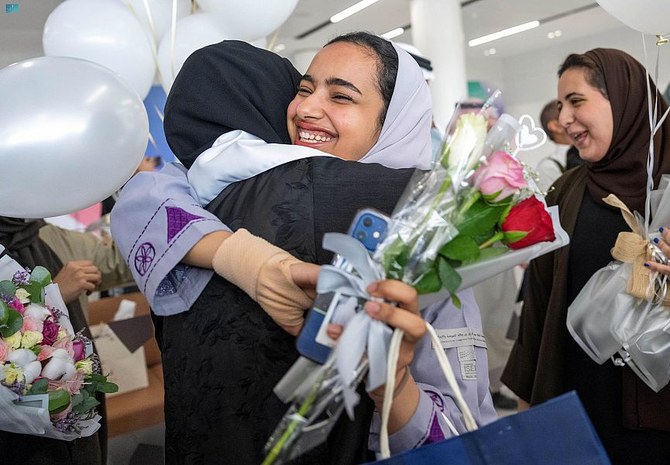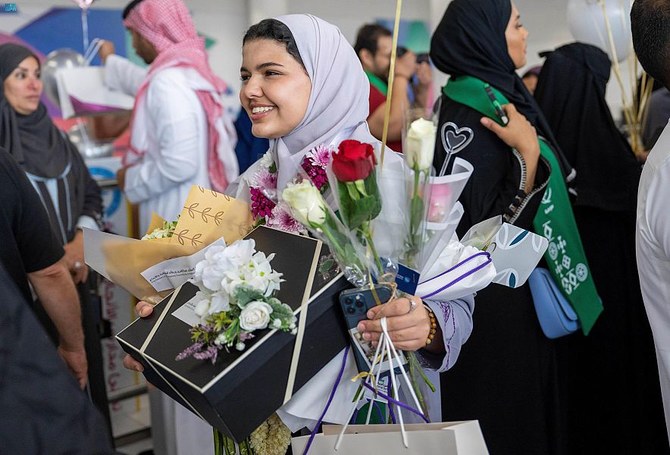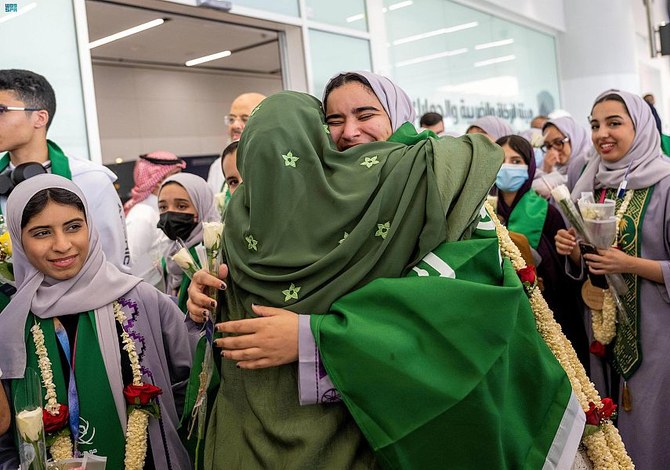MAKKAH: The Saudi science and engineering team arrived back in the Kingdom on Sunday after winning 27 awards, including 23 major and four special prizes, at the Regeneron International Science and Engineering Fair.
More than 1,800 people from more than 70 countries participated in the ISEF event, which was held from May 13-19 in the US.
Saudi Arabia was represented by the King Abdulaziz and His Companions Foundation for Giftedness and Creativity, and the Ministry of Education.
The team was greeted at the King Khalid International Airport in Riyadh by Faisal Al-Dawish, chairman of the board of directors of Mawhiba; Dr. Amal Al-Hazzaa, secretary-general of Mawhiba; Dr. Mohammed Al-Muqbil, undersecretary at the Ministry of Education; and several officials from the government and private sectors.
The Kingdom was also an official sponsor at the event and presented 18 special prizes to the best projects in the energy category.
ISEF is the largest pre-university scientific research and innovation competition fair.
The Saudi team won two first-place awards, and seven each for second, third and fourth.
This year’s total haul increased the number of prizes won by the Kingdom at ISEF to 133 — 92 major and 41 special prizes — since it began participating in 2007.
Mohammed Al-Arfaj won first prize in environmental engineering for his project which focused on using a contact liquid to capture CO2 found in fuel and air through a highly efficient and low-cost freezing method.
Al-Arfaj told Arab News: “What has been achieved is a national accomplishment, not just for us as students and institutions. This is the result of continuous work and relentless effort. We have always worked silently to attain these moments of recognition.
“This work has presented advanced scientific and knowledge models and honorable examples that emphasize the importance of nurturing and supporting gifted individuals capable of competing globally and representing the Kingdom in international competitions and forums, reflecting the quality and progress of education.”
He added: “The projects that were submitted and won underwent supervision by a select group of judges, scientists, supervisors, and experts before being awarded.”
Faisal Al-Muhaish won first place in chemistry for a project focused on “metal-organic framework-based electrocatalyst for a highly efficient and low-cost seawater hydrogen production."
He told Arab News that the award resulted from the high standards Saudi students had maintained from the previous year.
He added: “Mawhiba's supervisors always emphasize the importance of representing the Kingdom in the best possible way, contributing to its elevation and working diligently for the prosperity of this country.
“The sons and daughters of this nation are its builders and pillars, and they play a significant and effective role in its economic development. Technological innovation and its dissemination are fundamental pillars of development and success aligned with the Kingdom’s Vision 2030.
“The Kingdom is rich in its creative capacities, and every year we feel that we are diving deeper into our creative experiences. The mission and path were not paved with roses but resulted in exhausting and laborious work, supported by the material and human resources provided by the state, which has never spared any effort for its citizens, providing them with everything that distinguishes and intellectually equips them. This has kept them exceptional in international forums.”
Lian Al-Maliki, who achieved third place in the field of plant sciences, told Arab News about her project on the effect of iron oxide nanoparticles on the growth, survival, and toxicity of wheat plants. She described her experience as a dream come true.
Al-Maliki said that in the weeks leading up to the achievement, individuals had continued to work in various medical, scientific, biological, and physical fields, such as molecular and cellular biology, physical energy, medical and environmental engineering, and other sciences.
Majed Al-Kanani, media director at Mawhiba, said that the achievement in the US was a major accomplishment for the nation and reflected the significant integrated partnership between Mawhiba and the Ministry of Education.
He added: “This success is the result of collective and institutional work contributed by thousands of educational supervisors and gifted student administrations.
“What has been achieved is a triumph for Saudi talent, which has proven its worth and excellence on the international stage. The talented individuals demonstrated a high level of responsibility and creativity. They raised the pride of Saudis and contributed to the realization of an integrated knowledge system and the development of research-minded scientific thinkers.”

































